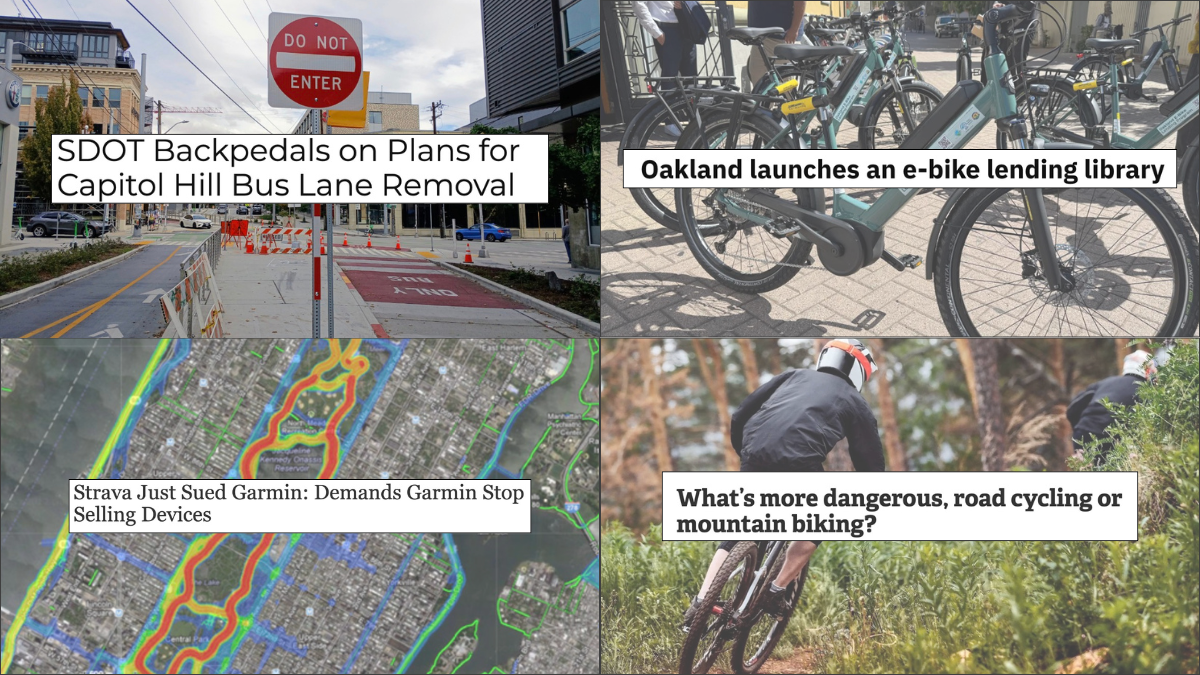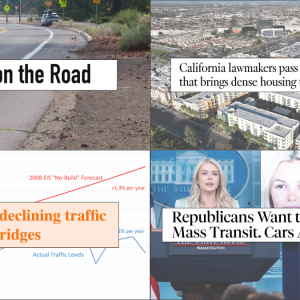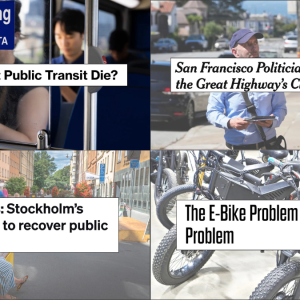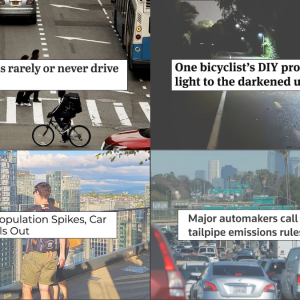Hi friends. Welcome to the week. I hope everyone is doing okay amid talk of federal troops and the latest onslaught of unhinged behavior from Trump and his cronies. Meanwhile, we have a city to run and work to do. Let’s get right to it by making sure we’re up to date with the most notable stories and other content from around the web in the past week.
E-bike lending library: I’ve heard through the grapevine that folks in our region are working on having e-bikes available on loan from libraries. This example from Oakland is a similar model. (Oaklandside)
Strongly worded letters: Interesting research in D.C. led to a firm identifying high-risk drivers and sending them a notice about how they’re more prone to crashes; and surprisingly (sarcasm), it didn’t have an impact. (WUSA)
Nature is soft: Interesting new study found that while mountain biking leads to more crashes overall, the severity of road cycling crashes is worse. That makes sense to me since there’s often more to break your fall and speeds are generally lower when you’re riding in the woods. (News Medical)
Seattle’s bus lane fight: In a story that echoes some of the recent infrastructure removal fights we’ve had in Portland, Seattle’s DOT was forced to reconsider plans to remove a bus lane after it sparked an outcry. (The Urbanist)
GPS wars: Strava has sued Garmin in a dispute over patents, saying that the device maker doesn’t have the right to market and sell technology related to segments and heatmaps. (DC Rainmaker)
The fast e-bike problem, part one: The tension around people riding e-bikes too fast around others is becoming a major story all across the country, as evidenced by this article about how folks are managing the issue in Manhattan’s Central Park. (NY Times)
The fast e-bike problem, part two: Then there’s this common scenario, when the term “e-bikes” is used in the headline, but the problem laid out in the story is really about e-motos. Regardless, people riding like jerks were a problem before e-bikes came around, but the added speed and ease to reach it is tipping this into bad territory fast. (Washington Post)
AI and the green wave: The idea of a “green wave” for cyclists — where signals turn green for riders — has been around for a long time and is even employed in downtown Portland; but this is the first I’ve heard where the signals use AI to make it happen. (Fast Company)
Who doesn’t have a car? A very helpful data dashboard and map delves into the demographics of the millions of Americans who cannot or choose not to drive. “Our findings show that this group—often overlooked in planning and policy decisions—is both large and diverse.” (Natural Resources Defense Council)
Thanks to everyone who sent in links this week. The Monday Roundup is a community effort, so please feel free to send us any great stories you come across.








Thanks for reading.
BikePortland has served this community with independent community journalism since 2005. We rely on subscriptions from readers like you to survive. Your financial support is vital in keeping this valuable resource alive and well.
Please subscribe today to strengthen and expand our work.
A bit about me — I’m a librarian. I hope the idea of using libraries to distribute e-bikes goes nowhere.
I’m sure people would love borrowing e-bikes free of charge for months (I know I would), but dumping services libraries have neither the expertise nor infrastructure to manage/maintain leads to expensive poor quality services that undermine libraries’ ability to perform their core functions <soapbox>society treats libraries like the organizational equivalent of secretaries — i.e. dump anything people imagine on them because they don’t have other real work</soapbox>
E-bikes keep getting presented as a game changer, but they really are only in certain circumstances. They make hills and distances accessible to a broader population, but they really don’t make any difference for shorter distances on flatter ground.
No amount of infrastructure changes that peoples’ paths cross constantly in urban areas, ebikes require (fairly expensive) maintenance, and that active transportation requires being out in cold/dark/wet/heat
Maybe it shouldn’t be up to the government to provide every service/product under the sun.
If there’s a product, let’s call it Z, and there’s a group of let’s say Z users who want to spread the good word about the amazing product that they use, WHY DON’T THEY PROVIDE a “check out” service?
I know, when you can use other people’s money (aka taxes) it’s extremely easy to come up with the next incredible idea!
Actually, libraries are a great example of why we benefit when the public is served by having services and products we own and share collectively. The point Kyle B is making is that while libraries already do this exceptionally well with certain services and products, they are not the best means to do this with other services and products. We don’t, for example, expect the librarian to perform open heart surgery, even though open heart surgery is a necessary and helpful thing.
(BTW, SolarEclips, the government currently provides lots of services to corporations that we are all collectively paying for, and it’s only benefiting the corporations. I’m more concerned about that. If, for example, “delivery services” (whether delivering goods or people) paid the real cost of their use of public roads, and the costs to remediate the pollution they cause, we’d all be better off. )
Sounds like you’ve never ridden an ebike (or read the article. They are not “free of charge for months”. They are a paid monthly rental with a large deposit). Ebikes make a world of difference on any and all terrain, regardless of distance. Not sure where this “I’m a librarian, so let me spread misinformation” take is coming from, but you should probably stick to what you know.
I’ve ridden a number of ebikes but don’t own one — please tell me what I said was inaccurate. Are you seriously suggesting an e-bike makes a significant difference for most people riding just a couple of miles on relatively flat terrain? And that this benefit clearly outweighs the added weight, maintenance, and other practical trade-offs of owning one?
As for the article, this is BikePortland—the Oakdale piece was clearly meant to provide background for potential local initiatives, not to be taken as a direct illustration.
There are multiple free ways to borrow e-bikes locally already, I was aware of additional discussion, book libraries that lend out free e-bikes exist (libraries lend all kinds of expensive things that make no sense — these are often called a “Library of Things”).
Even if I confine my comments to Oakdale, a 1.8 million dollar grant to rent out 50 ebikes (comes out to 38 grand per bike) to people at $20/month. Yeah, that sounds like something to emulate.
Not sure why you think you’re in a position to judge others.
The article also said this:
“Other California cities offer their own e-bike lending programs. Elk Grove, near Sacramento, offers eight different models of bikes that can be borrowed for up to three weeks at no cost. Long Beach offers free e-bike loans for up to three months, with two-thirds of the bikes reserved for low-income people. (Oakland is not planning to set aside e-bikes for that cohort.) Elsewhere in the U.S., cities like Madison, Wisconsin, loan out e-bikes for free to anyone with a public library card.”
I got the impression they’re just using the word “libraries” to mean a place you go to check one out (storefronts were mentioned in one version) versus traditional libraries with books, etc. in them–just like there are “tool libraries” in communities that just mean a place where you borrow tools.
Says right in the article. “[Fruitvale Bike Station] will now rent out 50 e-bikes…”
Re “AI and the green wave”: The whole “first I’ve heard where the signals use AI to make it happen” thing is more like … a company applying the “AI” buzzword to techniques that have been developing incrementally for a long time.
As an application of the tech, it’s fine, I guess. Like, if you’re going to have a signaling system so complicated it needs a whole network of computers to run, it might as well try to do something for bikes. But these kinds of systems (IMO essentially all ITS systems) are at best a distraction (of attention, time, and money) from the kinds of changes that American cities’ streets departments actually need. At worst they actively make things worse since their main use is optimizing car flow.
Agreed – signaling isn’t the main problem biking faces right now, it’s roads designed for cars and anything else is a mere footnote.
“The Green Wave” using AI not only feels unnecessary but kinda like a backdoor to rationalize further implementation of mass surveillance.
I’ve had some good rides on multi use paths and sometimes they are a going to a place I need to go. I hate to give that up but it’s pretty clear that we need to urge government to fill in the blanks on the map with something other than the all purpose MUP. As a rider, you can’t push it in a place where there are more than a few people walking or running.
Conflicts between wheeled vehicles still remain. The same constituency that wants surface streets tailored to bikes, skates, etc. should be persuadable to adopt rules, a culture, that will work for the whole spectrum.
Government seems hamstrung with car culture. A ‘shadow’ legislature for bike riders, of bike riders, could draft guidelines for the conscientious that could be refined to suit the larger community and eventually be adopted into the Oregon statutes. We’ve got Better Block to model human scale infrastructure, why not Better Rules of the Road?